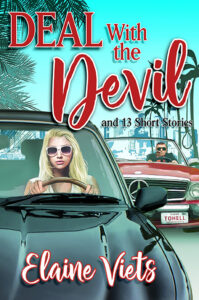
By Elaine Viets
Another Brave Author has given us what looks like a spy thriller. First, let’s read the first page. Then I’ll offer my comments, and you can add yours.
A Mind Trap
Everything in the dimly lit warehouse of the aerospace company appeared
to be as it should. And for Edward Malver, crouching in the deeper shadows of
some packing crates, everything was as it should be. His digital wristwatch showed it
was midnight and every employee except one security guard had gone home many
hours earlier.
Widely spaced overhead lighting cast pools of weak light in a murky realm of lighter
and darker shades of black. Metal shipping containers and wooden packing crates of
all sizes were stacked in rows like giant tombstones in a netherworld. Malver stood up
and hurried toward the exit downstairs.
He didn’t want to remain any longer than was absolutely necessary. The risk of
discovery increased with every passing minute, and the dark made him uneasy. Malver
shuddered. If he stayed in it too long, he knew the terrible memories would resurface to
savage him.
Malver was relieved to see how well his black pullover sweater and slacks blended in
with the surrounding darkness, camouflaging his tall slender frame and rendering him
almost a part of the darkness. He checked his blue nitrile examination gloves to be sure
they were not torn, then pulled a dark beanie further down over his gray-peppered black
hair. Walking with the silence of a shadow, he glanced around while listening for any
out-of-place sounds. All was as quiet as the grave.
Malver’s lock picks, both manual and electronic, rested in his nylon shoulder pouch next to the photographs he’d just taken of the secret Raptor missile. The Raptor was a surface-to-air missile with a “smart” computer guidance system making it virtually
impossible to fool or escape from. Really bad news for any fighter or bomber pilot it
was fired at. The Raptor had taken dozens of scientists seventeen years to develop
and perfect. Malver could have targeted the minds of some of the key scientists but it
was so much easier to just steal what he needed; truly a rare opportunity too good to
pass up, he thought.
He’d be selling the photos of the technical specifications and schematic diagrams
three days from tonight. The photos would earn him good money. But in this instance,
the money was secondary. Malver was pleased at how smoothly this operation was
going, on schedule and with no glitches.
Then he saw the security guard approach the catwalk
Elaine’s Comments:
Our Brave Author gets this novel off to a creepy start, but we need someone to root for – or against. Is Malver a good guy or a bad one? Is he an operative for the United States, or an enemy spy? Why does he need these plans and who will he give them to?
It’s important that we know.
For the sake of this critique, let’s say he’s a villain. Then this thriller can have a dramatic race to keep the Raptor plans from falling into enemy hands.
Also, the opening needs to ratchet up the tension. In the first paragraph, I’ve made some small cuts to move the pace along. I also had Malvern checking his wrist watch, getting rid of the passive voice “his wrist watch showed it was . . .” I left the second paragraph untouched.
In Paragraphs 3 and 4, I’ve done more tightening, getting rid of unnecessary words such as “in,” “just” and “so” I changed “darkness” to “gloom” to avoid repeating the word. Nitrile “examination” gloves is unnecessary. Your readers know what nitrile gloves are. I cut “as the grave.” It’s cliched.
The phrase that puts manual and electronic lock picks in apposition has been recast, so the sentence moves smoothly. Also, I cleaned up some other phrases. The last paragraph is fine, except it needs a period at the end.
PARAGRAPH 1 Everything in the dimly lit warehouse of the aerospace company appeared to be as it should. AndfFor Russian agent Edward Malver, crouching in the deeper shadows of some the packing crates, everything was as it should. be. His wristwatch showed it was He checked his digital wristwatch. Midnight. ed it was midnight and Every employee except one security guard had gone home. The lazy Americans didn’t stay late. The new Cold War had started when President Vladimir Putin offered to support the Russian-speaking separatists in eastern Ukraine. The clueless West called his actions an invasion, but what did they know? History was on Mother Russia’s side. manyhours earlier.
PARAGRAPH 2 Widely spaced overhead lighting cast pools of weak light in the murky blackness. Metal shipping containers and wooden packing crates were stacked in rows like giant tombstones. Malver stood up and hurried toward the downstairs exit.
PARAGRAPH 3 Malver’s black pullover sweater and slacks blended in with the darkness, camouflaging his tall slender frame, and rendering him almost a part of the gloom. darkness. He checked his blue nitrile examination gloves to be sure they were not torn, then pulled a dark beanie further down over his gray-peppered black hair. Walking silent ly as a shadow, he glanced around, while listening for anything out of place sounds. All was as quiet. as the grave.
PARAGRAPH 4 Malver’s lock picks, both manual and electronic lock picks rested in his nylon shoulder pouch next to the photographs he’d just taken of the secret Raptor missile. Developed by the US, the Raptor was a surface-to-air missile with a “smart” computer guidance system making it virtually impossible to fool or escape. from. Really Bad news for any fighter or bomber pilot in its path. it was fired at. The Raptor had taken dozens of scientists seventeen years to develop and perfect. Malver could have targeted the minds of some of the key scientists’s minds, but it was so much easier to just steal what he needed. This ; truly a rare opportunity was too good to pass up, he thought.
PARAGRAPH 5 He’d be selling the photos of the technical specifications and schematic diagrams three days from tonight. The photos would earn him good money. But in this instance,
the money was secondary. Malver was pleased at how smoothly this operation was
going, on schedule and with no glitches.
PARAGRAPH 6 Then he saw the security guard approach the catwalk.
Here’s a clean version:
Everything in the dimly lit warehouse of the aerospace company appeared as it should. For Edward Malver, crouching in the deeper shadows of the packing crates, everything was as it should. He checked his digital wristwatch. Midnight. Every employee except one security guard had gone home. The lazy Americans didn’t stay late. The new Cold War had started when President Vladimir Putin offered to support the Russian-speaking separatists in Eastern Ukraine. The clueless West called Putin’s actions an invasion, but what did they know? History was on Mother Russia’s side.
Widely spaced overhead lighting cast pools of weak light in the murky blackness. Metal shipping containers and wooden packing crates were stacked in rows like giant tombstones. Malver stood up and hurried toward the downstairs exit.
Malver’s black pullover sweater and slacks blended with the darkness, camouflaging his tall slender frame, rendering him almost part of the gloom. He checked his blue nitrile gloves to be sure they were not torn, then pulled a dark beanie further down over his gray-peppered black hair. Walking silent as a shadow, he glanced around, listening for anything out of place. All was quiet.
Malver’s manual and electronic lock picks rested in his nylon shoulder pouch next to the photographs he’d taken of the secret Raptor missile. Developed by the United States, the Raptor was a surface-to-air missile with a “smart” computer guidance system making it virtually impossible to fool or escape. Bad news for any fighter or bomber pilot in its path. The Raptor had taken scientists seventeen years to develop and perfect. Malver could have targeted some of the key scientists’s minds, but it was much easier to steal what he needed. This rare opportunity was too good to pass up, he thought.
He’d be selling the photos of the technical specifications and schematic diagrams three days from tonight. The photos would earn him good money. But in this instance, the money was secondary. Malver was pleased at how smoothly this operation was going, on schedule and with no glitches.
Then he saw the security guard approach the catwalk.
TWO MORE NOTES: Some of your manuscript was in purple ink, and some in black. Please be consistent when you show it to an editor.
And finally, I like the name of your villain.
Keep writing, Brave Author.
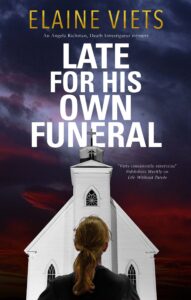
LATE FOR HIS OWN FUNERAL is “a fascinating exploration of sex workers, high society, and the ways in which they feed off of one another.” Enter to win a copy here: https://kingsriverlife.com/08/06/late-for-his-own-funeral-by-elaine-viets/

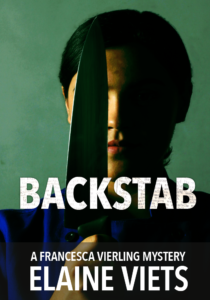 By Elaine Viets
By Elaine Viets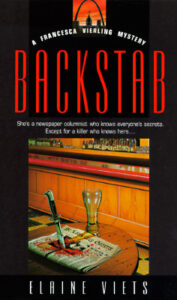
 But “Backstab” includes some funny stories from my time as a newspaper columnist in St. Louis. One favorite was a true story of a parking spot. St. Louis is a city where the parking spot is sacred — and never more so than on a snowy day. Those of you who have survived snowy winters know this.
But “Backstab” includes some funny stories from my time as a newspaper columnist in St. Louis. One favorite was a true story of a parking spot. St. Louis is a city where the parking spot is sacred — and never more so than on a snowy day. Those of you who have survived snowy winters know this.

 “Late for His Own Funeral” will be published by Severn House July 5. Pre-order your copy now from your favorite bookstore. The hardcover and ebook are available from Amazon:
“Late for His Own Funeral” will be published by Severn House July 5. Pre-order your copy now from your favorite bookstore. The hardcover and ebook are available from Amazon: 
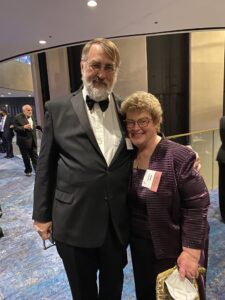
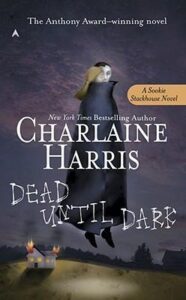
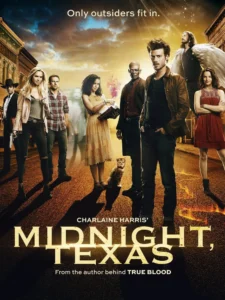 EV: What did you write after Sookie ended?
EV: What did you write after Sookie ended?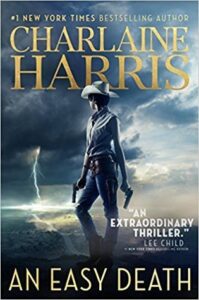
 EV: You’ve also had several Hallmark movies based on your Aurora Teagarden mysteries. Is there another one coming up?
EV: You’ve also had several Hallmark movies based on your Aurora Teagarden mysteries. Is there another one coming up?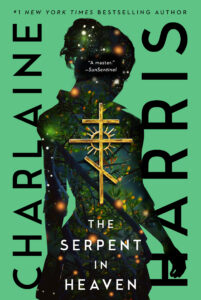
 By Elaine Viets
By Elaine Viets But what about ordinary writers? Should we read our own work?
But what about ordinary writers? Should we read our own work?
 When I finished, I needed to put my tongue in a sling. My sore, scratchy throat took weeks to recover.
When I finished, I needed to put my tongue in a sling. My sore, scratchy throat took weeks to recover.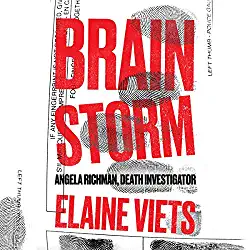
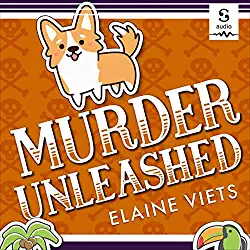
 By Elaine Viets
By Elaine Viets (2) Elaine: I walked over to him and looked right into his red eyes. We were both the same height.
(2) Elaine: I walked over to him and looked right into his red eyes. We were both the same height. (3) Elaine: The cut on her forehead had been stitched. She’d have a heck of a bruise there tomorrow.
(3) Elaine: The cut on her forehead had been stitched. She’d have a heck of a bruise there tomorrow.
 (6) Elaine: I fired up my iPad and opened up the Death Scene Investigation form.
(6) Elaine: I fired up my iPad and opened up the Death Scene Investigation form.

 Now hear this: My Dead-End Job mysteries Murder with Reservations, Clubbed
Now hear this: My Dead-End Job mysteries Murder with Reservations, Clubbed








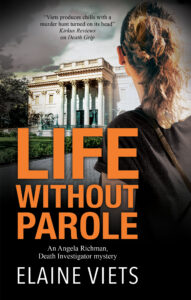 Fans of J.A. Jance and Lisa Gardner will love this exploration of the little-known job of death investigator in small-town Missouri where Angela Richman finds herself investigating the lives and secrets of the one percenters in Chouteau Forest.
Fans of J.A. Jance and Lisa Gardner will love this exploration of the little-known job of death investigator in small-town Missouri where Angela Richman finds herself investigating the lives and secrets of the one percenters in Chouteau Forest. By Elaine Viets
By Elaine Viets
 Want to go trendy? For a while every third book had “Girl” in the title. That trend started with novels like Gillian Flynn’s Gone Girl and Paula Hawkins’ The Girl on the Train, not to mention The Girls With the Dragon Tattoo by Stieg Larsson. None of these women were the girl next door, but their books sold. By the way, The Girl Next Door was used by a wide range of writers, from Brad Parks to Ruth Rendall. It’s even a horror story.
Want to go trendy? For a while every third book had “Girl” in the title. That trend started with novels like Gillian Flynn’s Gone Girl and Paula Hawkins’ The Girl on the Train, not to mention The Girls With the Dragon Tattoo by Stieg Larsson. None of these women were the girl next door, but their books sold. By the way, The Girl Next Door was used by a wide range of writers, from Brad Parks to Ruth Rendall. It’s even a horror story.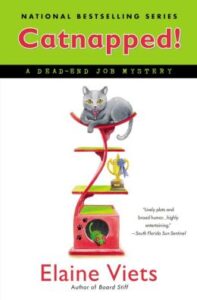
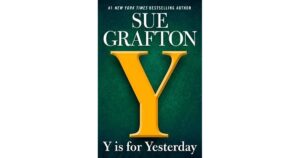 Series titles: Sue Grafton has her alphabet series, beginning with A Is for Alibi and ending with Y Is for Yesterday. Mary Higgins Clark and her partner-in-crime Alafair Burke have a song title series, starting with You Don’t Own Me. Stephanie Plum uses numbers. Her latest is Game on: Tempting Twenty-eight.
Series titles: Sue Grafton has her alphabet series, beginning with A Is for Alibi and ending with Y Is for Yesterday. Mary Higgins Clark and her partner-in-crime Alafair Burke have a song title series, starting with You Don’t Own Me. Stephanie Plum uses numbers. Her latest is Game on: Tempting Twenty-eight. Did you ever say this? “I’m trying to write a short story, but I’m blocked. I’m getting nowhere.”
Did you ever say this? “I’m trying to write a short story, but I’m blocked. I’m getting nowhere.”
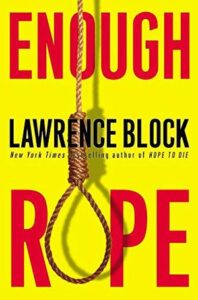 “This Crazy Business of Ours”
“This Crazy Business of Ours”


 – No more stories about husbands who kill wives, or vice versa.
– No more stories about husbands who kill wives, or vice versa.